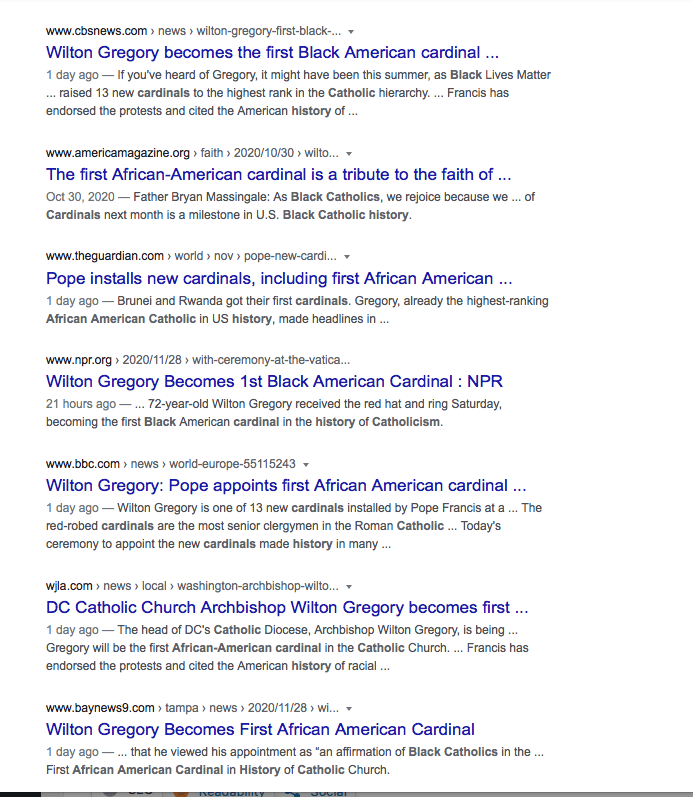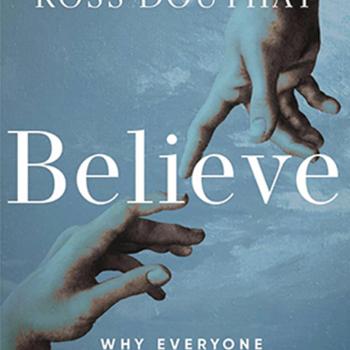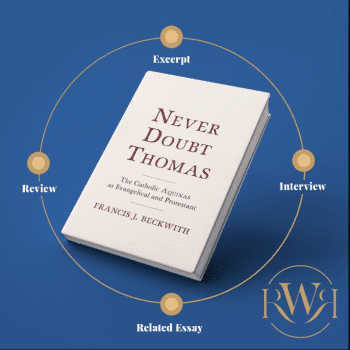Last week Pope Francis elevated Archbishop Wilton Gregory of Washington, DC to the College of Cardinals. He is the first American of African descent to become a Cardinal, though he is not first in the history of the Church. (Among the living non-American African cardinals are Peter Kodwo Appiah Turkson, Francis Arinze, and Robert Sarah) Because of this mistaken tweet by CBS News, I wanted to find out more about African Catholics that served the church from its beginnings.
So, this is what turned up when I Googled, “Black cardinals in Catholic history.”
And the subsequent pages didn’t get much better. With the exception of this informative, but not updated, website called “Black and Christian,” virtually every entry for pages on end were about Archbishop Gregory’s elevation. There were no links to scholarly works that address my historical query. (It’s possible that my eye skipped one or two of them, but they should be prominent and up front, given the specificity of my query). After about 20 minutes of this, I gave up. I thought to myself, “I’ll use some of the many academic search engines to which Baylor gives me access through its libraries.” But here’s the point: ordinary people, curious about the history of Africa and the Church’s hierarchy–when prompted by the historically important Gregory elevation–will be ocularly machine-gunned with the newest stories, press releases, tweets, and op-eds if they Google the subject. They will not become more informed or more knowledgeable than they were before their search. This is because Google is not in the business of making its users informed or knowledgeable, let alone wise. It relies on algorithms that nudge us to look only in the present, the current, the recent, the immediate, and the now. Google writes:
With the amount of information available on the web, finding what you need would be nearly impossible without some help sorting through it. Google ranking systems are designed to do just that: sort through hundreds of billions of webpages in our Search index to find the most relevant, useful results in a fraction of a second, and present them in a way that helps you find what you’re looking for.
These ranking systems are made up of not one, but a whole series of algorithms. To give you the most useful information, Search algorithms look at many factors, including the words of your query, relevance and usability of pages, expertise of sources, and your location and settings. The weight applied to each factor varies depending on the nature of your query—for example, the freshness of the content plays a bigger role in answering queries about current news topics than it does about dictionary definitions. [emphasis added]
This is how Google makes us stupid. The idea that “relevant,” “useful,” “freshness,” and “current” are universal categories that apply to all searches for information favors the utilitarian and the present, and by its very nature excludes (or diminishes) the perennial and the transcendent. This is why it was next to impossible for me to find in my Google search anything historically rich on African hierarchy and the Church, even though that sort of information is far more meaningful to the spiritual and intellectual development of millions of Catholics (and other Christians) than scores of news stories, press releases, tweets, and op-eds about the very same current event. Given Google’s algorithms, I suspect that if Archbishop Gregory had not become a Cardinal on Friday, my search would have been probably far more fruitful. But, ironically, I would have not thought about conducting the search if not for Archbishop Gregory’s elevation. That’s the tyranny of presentism.














